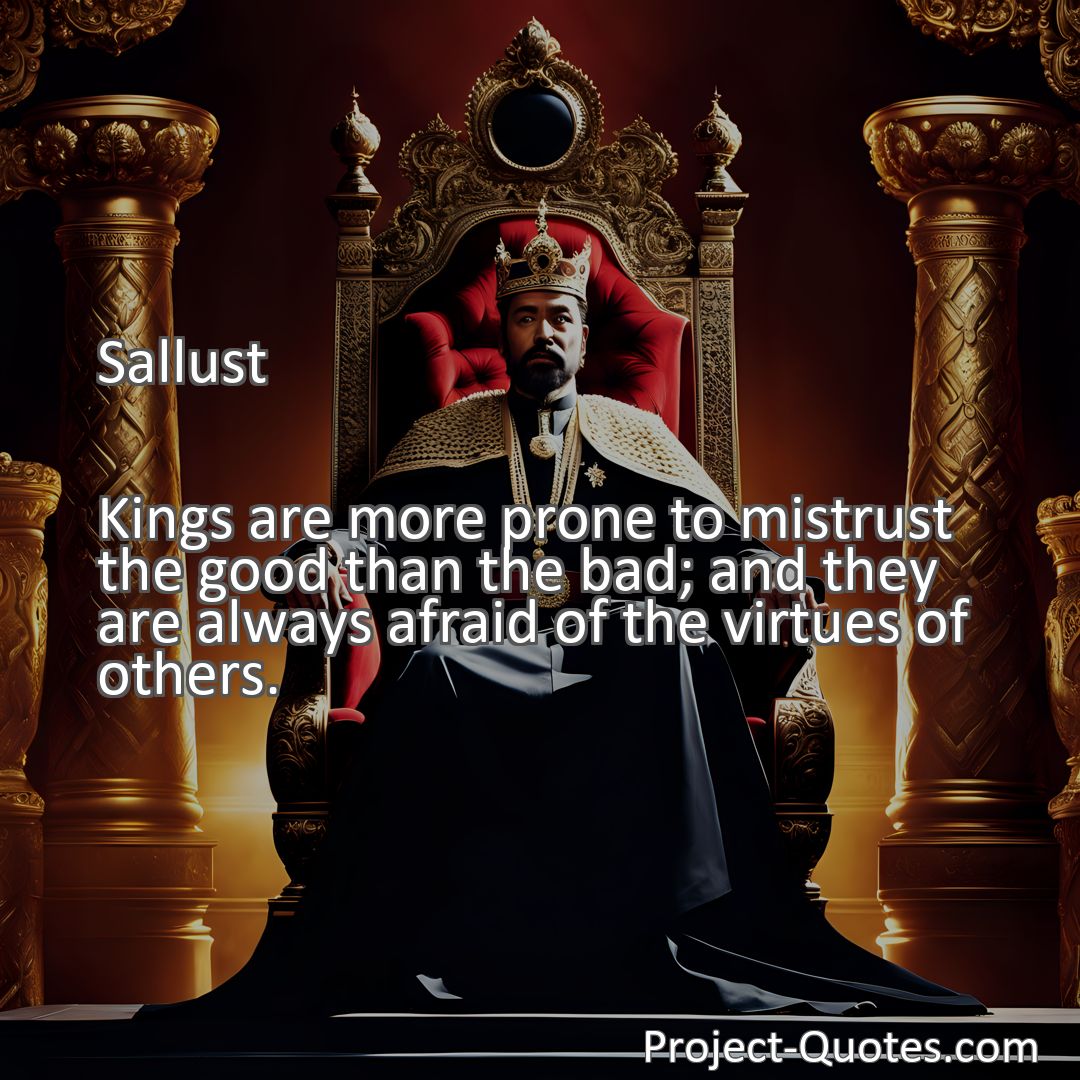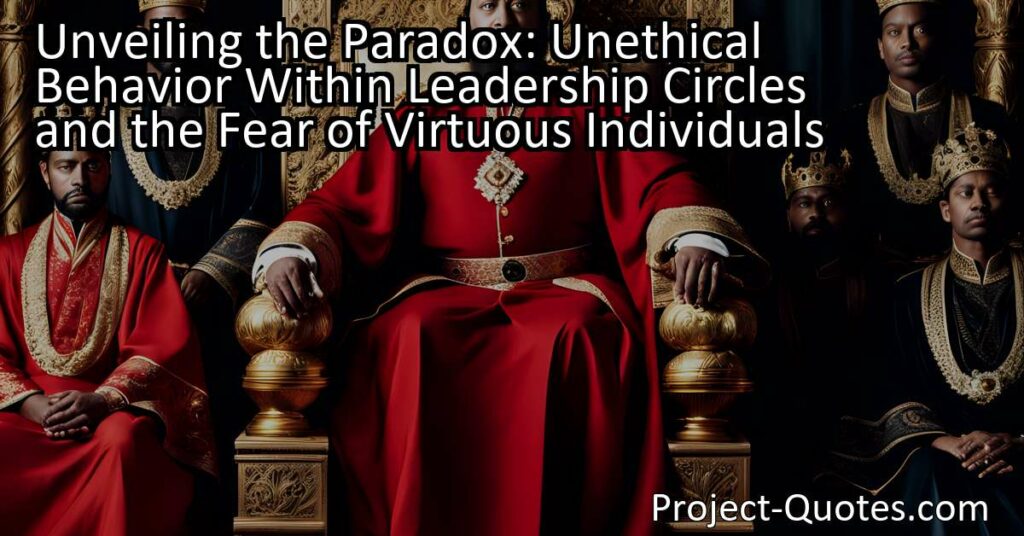Kings are more prone to mistrust the good than the bad; and they are always afraid of the virtues of others.
Sallust
Unveiling the Paradox: Unethical Behavior Within Leadership Circles and the Fear of Virtuous Individuals Leaders, including kings and those in positions of power, tend to be suspicious of individuals who showcase goodness and virtue, often more so than those who exhibit corrupt behavior. This mistrust stems from personal insecurities and a fear of being overshadowed by others’ virtues. It creates an environment where virtuous individuals are marginalized, leading to stagnation, corruption, and a lack of progress. To break free from this pattern, leaders must confront their own insecurities, value virtues, and foster collaboration over solitary power.
Table of Contents
Meaning of Quote – Kings are more prone to mistrust the good than the bad; and they are always afraid of the virtues of others.
In his quote, Sallust, a famous Roman historian, sheds light on an intriguing aspect of human nature, particularly regarding those in positions of power. He suggests that kings, or leaders in general, possess a tendency to be suspicious of individuals who showcase goodness and virtue. Surprisingly, they are more fearful of these positive traits than of the vices and malevolence that may exist within their realm. As we delve deeper into this idea, we can uncover the reasons behind such a phenomenon, the impact it has on leadership, and the lessons we can draw from it.
One might initially find it perplexing that leaders, who are expected to embody the values of goodness, are more mistrustful of virtuous individuals than of the corrupt ones. However, upon closer examination, it becomes evident that kings’ mistrust stems from a combination of personal insecurities, ensuring their own power remains unchallenged, and a deep-rooted fear of being overshadowed by the virtues of others.
Firstly, it is important to acknowledge that leaders, just like any other individuals, are susceptible to personal insecurities and flaws. The burdens of leadership often lead to a heightened fear of being exposed and vulnerable. When they encounter individuals who genuinely possess virtues such as honesty, integrity, and altruism, it may remind them of their own shortcomings. Consequently, this can trigger feelings of inadequacy and, in an attempt to protect their own image, they develop a reflexive mistrust towards those who embody the qualities they lack.
Moreover, leaders are acutely aware of the power and influence they hold, and they are often wary of threats to their authority. The virtues and moral fiber exhibited by others might be perceived as a challenge to their own leadership, potentially undermining their control over their subjects. Consequently, it is not surprising that kings, fearing a shift in power dynamics, view virtuous individuals as a potential threat to their reign. By dismissing or marginalizing these individuals, leaders aim to safeguard their power and maintain their status quo.
Additionally, leaders may be afraid of the virtues displayed by others due to an underlying fear of comparison. When surrounded by individuals who continually display goodness and virtues, kings might feel that their own accomplishments pale in comparison. This can result in feelings of inferiority as they are constantly reminded of their shortcomings. To alleviate this discomfort, they may choose to mistrust and distance themselves from those individuals who outshine them in the realms of moral strength and ethical conduct.
It is worth noting that Sallust’s observation is not limited to kings; it can be extended to leaders in various contexts, such as political, corporate, or even within smaller groups. The fear of virtuous individuals might manifest itself differently depending on the field of leadership, but the underlying reasons remain the same. It is a paradoxical situation where leaders, who should strive to nurture and encourage goodness, instead harbor suspicion and mistrust.
The impact of this mistrust of virtues within leadership can have far-reaching consequences. Firstly, it creates an environment where individuals who demonstrate integrity, honesty, and other positive values may be marginalized or even punished. This discourages those who possess these traits from stepping forward and contributing to their fullest potential. Consequently, societies miss out on the potential contributions and insights of these individuals, leading to stagnation and a lack of progress.
Furthermore, this tendency to mistrust virtues can perpetuate a culture of corruption and unethical behavior within leadership circles. When leaders prioritize self-interest and do not value virtue, it sends a message to those under their influence that pursuing personal gain at the expense of morality is acceptable. This sets a dangerous precedent where individuals prioritize personal gain over collective well-being, leading to a decay in trust, social cohesion, and effective leadership.
History is replete with examples that support Sallust’s observation. Various leaders throughout time have demonstrated a mistrust of virtues and have actively stifled those who embody them. These instances serve as cautionary tales, highlighting the negative consequences that can arise from leaders’ fear and mistrust of goodness. However, they also provide opportunities for growth and transformation, as they prompt individuals to critically assess and challenge the leadership practices that perpetuate this mistrust.
To break free from this pattern of mistrust, leaders must be willing to introspect and confront their own insecurities and fear of being overshadowed. They should strive to create an environment where virtues are valued, nurtured, and celebrated. This requires leaders to model the behavior they seek from others, embodying the virtues they wish to see in their subordinates.
In addition, leaders need to recognize that true strength lies in collaboration and collective progress, rather than in a solitary quest for power. By embracing the virtues exhibited by others, leaders can create a team culture that encourages the growth and development of everyone involved. This shift in mindset can lead to a more harmonious and effective leadership dynamic, fostering an atmosphere where virtues are cherished and mistrust becomes obsolete.
As we reflect on Sallust’s quote and its implications, it becomes clear that leaders’ fear of virtues is a testament to the complexities of human nature. We are all prone to insecurities and fears, especially in positions of power. However, it is through introspection, self-awareness, and a genuine commitment to personal growth that leaders can rise above these tendencies. When leaders actively seek and embrace goodness and virtue, they create a paradigm of trust, collaboration, and ethical leadership that can inspire and transform societies for the better.
In conclusion, Sallust’s quote is a thought-provoking insight into the complexities of leadership and human nature. Leaders’ mistrust of virtues often stems from personal insecurities, a desire to maintain power, and a fear of being overshadowed. However, this tendency can have detrimental effects, stifling the potential contributions of virtuous individuals, perpetuating corruption, and hindering progress. To overcome this mistrust, leaders must confront their insecurities, foster an environment that values virtues, and champion collaboration over solitary power. Ultimately, embracing virtues is not a sign of weakness but an opportunity for growth and the foundation for effective and ethical leadership.
I hope this quote inspired image brings you hope and peace. Share it with someone who needs it today!


